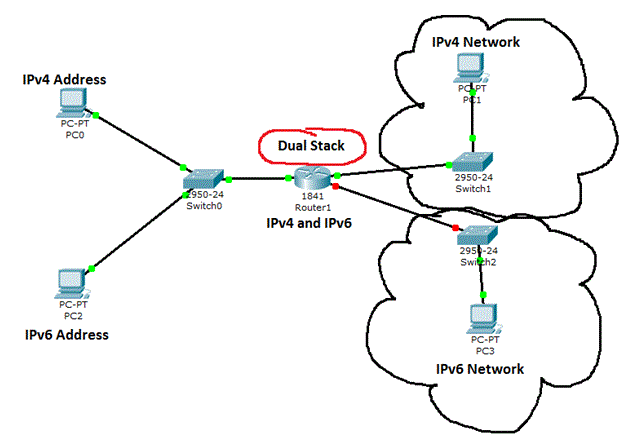IPv6 Transition Methods and Strategies
IPv6 Transition Methods and Strategies
As we know that IPv6 is a new technology and not all devices in the world have switched to IPv6. There are still many devices still operating on the IPv4 and would like interaction with the newer devices using IPv6.
Thus the technology for communication between IPv4 and IPv6 was invented. There are several mechanisms through which this can be achieved. Few examples are:
Dual stacking: As the name suggests this mechanism make use of both the IPv4 and IPv6. Which means the device is configured with both the IPv4 and IPv6 address. The drawback would be that it would need two routing tables and processes. Also the CPU utilization will be comparatively higher.
Manual IPv6 over IPv4 tunneling (6 to 4): Here the IPv6 packet is encapsulated under and IPv4 packet and sent across an IPv4 network. In order to use this feature dual stack should be configured.
Intra -site Automatic Tunnel Addressing Protocol ( ISATAP): This mechanism of transition makes use of Virtual links which then connects different IPv6 sites in the area or site that are actually IPv4. For this mechanism to function correctly as well the use of Dual stack is important.
Teredo Tunneling: Normally the tunneling is performed by the router but in this mechanism, tunneling is performed by the hosts, thus the hosts are configured to be running as dual stacks.
NAT -PT (Proxy and Translation): Using this mechanism, we feel somewhat like using the normal NAT. Here a device for address translation is used which does the translation between an IPv6 to IPv4 address and vice versa.
The most common transition is the DUAL STACK. It is configured on a device on either same or different interfaces. The below figure shows the router configured with Dual Stack, thus able to configure and use IPv4 and IPv6, making it possible for computers with either IPv4 or IPv6 to communicate with each other.
Read more
- IPV6
- IPv4 vs IPv6
- Difference Between IPv4 and IPv6
- Built-in Features and advantages of IPv6
- How to configure Cisco Router with IPv6
- How to Configure IPv6 Address
- IPv6 ICMP
- IPv6 Address Format
- IPv6 Enabled Command Line tools
- IPv6 Neighbor Discovery Protocol
- Configure IPv6 on Windows 7
- IPv6 Address Auto Configuration Process
- IPv6 Terms and Concepts
- Special IPv6 Addresses
- IPv4 Limitations

